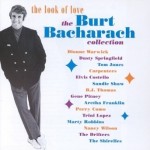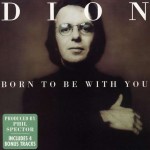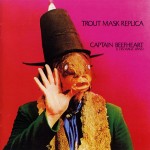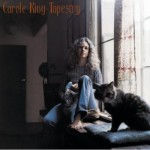
Spend enough time around rock music — or, at least, rock critics — and you’ll be convinced that any number of Seminal Works, Forgotten Gems and Timeless Standards are must-have items for your record collection.
Even if they turn out to be, you know, retreads dressed up as brilliant pop redux (Gene Clark’s post-Byrds catalogue, most of Syd Barrett‘s sides, all but a handful of things on the Rhino Records imprint), important-sounding yet all-but-unlistenable vanity projects (much of Richard Thompson, later-period Rush, Laura Nyro‘s Eli and The Thirteenth Confession) or calculated efforts at creativity that are just a bit too showy (XTC‘s psychedelic offshoot the Dukes of Statosphear, almost everything that followed “Handle with Care” by the Traveling Wilburys, Brian Wilson’s ghost-band attempt at reworking SMiLE).
Not that we haven’t been known to wander off into this kind of fetishized didacticism.
Yep, we have Glyn John’s verite bootleg mix of the Beatles’ nixed Get Back album. And, yes, all of the Dorsey-period Frank Sinatra. And two dusty treasures from Prince, the deleted Black Album and his Rubber Band sessions with Miles Davis. So, sure, we identified in some ways with the curatorial snobbery that writer Nick Hornby brilliantly sent up in 1995’s list-obsessed “High Fidelity,” later turned into a Forgotten Gem of a movie featuring the mirthfully kinetic Jack Black in a career-making role as ratty-concert-T-shirt-wearing counter-culture elitist.
[kml_flashembed movie="http://www.youtube.com/v/1GIGcWLwSDQ" width="600" height="344" allowfullscreen="true" fvars="fs=1" /]
Alas, amidst all this talk of underrated brilliance, there remain a few things that should have been left unsung. And we don’t mean unsung in the good way.
In honor of Hornby, we made a list. Call it “Five Avoidable So-Called Rock Classics.”
 ANYTHING BY BURT BACHARACH: Meet the standard-bearer of an instantly dated post-modern kitsch-as-cool movement. So, OK, credentialed hipster Elvis Costello recorded an album a few years back with Bacharach. That can’t erase a lifetime of schlocky Timeless Standards like B.J. Thomas’ “Raindrops Keep Falling on My Head,” the Carpenters‘ “(They Long to Be) Close to You” and a raft of hits for former Drifters backup singer Dionne Warwick, including “I Say a Little Prayer,” “Do You Know the Way to San Jose” and “Walk on By.” So, OK, he was once married to old-school bombshell Angie Dickinson. No matter. The bulk of Burt’s work still fully inhabits every plaid-pantsed easy-listening cliche. That said, you’ll want to test drive Bacharach’s “What’s New, Pussycat?,” a creepy-womanizer record that is so over-the-top in the hands of Tom Jones that you simply can’t avert your gaze.
ANYTHING BY BURT BACHARACH: Meet the standard-bearer of an instantly dated post-modern kitsch-as-cool movement. So, OK, credentialed hipster Elvis Costello recorded an album a few years back with Bacharach. That can’t erase a lifetime of schlocky Timeless Standards like B.J. Thomas’ “Raindrops Keep Falling on My Head,” the Carpenters‘ “(They Long to Be) Close to You” and a raft of hits for former Drifters backup singer Dionne Warwick, including “I Say a Little Prayer,” “Do You Know the Way to San Jose” and “Walk on By.” So, OK, he was once married to old-school bombshell Angie Dickinson. No matter. The bulk of Burt’s work still fully inhabits every plaid-pantsed easy-listening cliche. That said, you’ll want to test drive Bacharach’s “What’s New, Pussycat?,” a creepy-womanizer record that is so over-the-top in the hands of Tom Jones that you simply can’t avert your gaze.
 THE SEX PISTOLS: Having an oh-so provocative band name isn’t, in and of itself, punk. Yet, that’s about as close we get on 1977’s Seminal Work Never Mind the Bollocks — a deathless dud from a pre-packaged one-album band that, with help from Svengali-marketer Malcolm McLaren, turned the then-new do-it-yourself aesthetic on its ear. Where tough, raw-boned groups like the Ramones, Clash, Stooges and Jam helped push back against the arena-stuffing corporate rock of the day, John Lydon and Co. were nothing more than the Monkees 2.0 — another Trojan-horse record-company sham. To the surprise of no one, they decided to cash in on a 2007 reunion tour, completing the life cycle of every empty-shelled cicada-like pop confection.
THE SEX PISTOLS: Having an oh-so provocative band name isn’t, in and of itself, punk. Yet, that’s about as close we get on 1977’s Seminal Work Never Mind the Bollocks — a deathless dud from a pre-packaged one-album band that, with help from Svengali-marketer Malcolm McLaren, turned the then-new do-it-yourself aesthetic on its ear. Where tough, raw-boned groups like the Ramones, Clash, Stooges and Jam helped push back against the arena-stuffing corporate rock of the day, John Lydon and Co. were nothing more than the Monkees 2.0 — another Trojan-horse record-company sham. To the surprise of no one, they decided to cash in on a 2007 reunion tour, completing the life cycle of every empty-shelled cicada-like pop confection.
 DION’S POST-“WANDERER” OUTPUT: Rock fans love doomed genius — and, even more so, doomed projects. (This has notably played out through the continuing interest in, say, the aforementioned Beach Boys’ SMiLE project, Ricky Nelson’s Stone Canyon Band of the early 1970s, any failed Pete Townshend rock-opera, and odd session leftovers from died-too-young musical martyrs like the Doors, Gram Parsons, John Lennon, Janis Joplin and, most recently, Jimi Hendrix.) How else to explain the enduring deification of Dion’s 1975 misfire Born to Be With You? Dion had battled heroin two decades after his hitmaking period with the Belmonts, and returned with a wider palette of musical tastes (trying everything from blooze-rock, to folk, to Christian music) only to be largely ignored by the record-buying public. Along the way, Born to Be With You somehow became the Forgotten Gem, despite being crafted with a now-sadly familiar wood-panelled muffle favored by crazy-as-an-outhouse-rat producer Phil Spector. (He stereotypically brought along no fewer than a dozen guitarists, seven percussionists and five pianists.) This UK-only release also wasn’t officially issued in America until 2001, which perhaps provides some mysterious cache, as well. Instead, we find a claustrophobic, relentlessly death-obsessed mess — lowlighted by a morbidly funereal take on (no kidding) “He’s Got the Whole World in His Hands.” Just stick with the doo-wop stuff.
DION’S POST-“WANDERER” OUTPUT: Rock fans love doomed genius — and, even more so, doomed projects. (This has notably played out through the continuing interest in, say, the aforementioned Beach Boys’ SMiLE project, Ricky Nelson’s Stone Canyon Band of the early 1970s, any failed Pete Townshend rock-opera, and odd session leftovers from died-too-young musical martyrs like the Doors, Gram Parsons, John Lennon, Janis Joplin and, most recently, Jimi Hendrix.) How else to explain the enduring deification of Dion’s 1975 misfire Born to Be With You? Dion had battled heroin two decades after his hitmaking period with the Belmonts, and returned with a wider palette of musical tastes (trying everything from blooze-rock, to folk, to Christian music) only to be largely ignored by the record-buying public. Along the way, Born to Be With You somehow became the Forgotten Gem, despite being crafted with a now-sadly familiar wood-panelled muffle favored by crazy-as-an-outhouse-rat producer Phil Spector. (He stereotypically brought along no fewer than a dozen guitarists, seven percussionists and five pianists.) This UK-only release also wasn’t officially issued in America until 2001, which perhaps provides some mysterious cache, as well. Instead, we find a claustrophobic, relentlessly death-obsessed mess — lowlighted by a morbidly funereal take on (no kidding) “He’s Got the Whole World in His Hands.” Just stick with the doo-wop stuff.
 ANYTHING BY CAPTAIN BEEFHEART: In particular 1969’s overrated Forgotten Gem Trout Mask Replica, a free-thinking concerto which many somehow say helped set the stage for post-punk, new-wave surrealism and alternative rock. Really, this album’s producer, Frank Zappa, deserves more credit/blame for jump starting those rock subgenres. Meanwhile, the late Beefheart (nee Don Van Vliet) more often dissolved into overly concocted-sounding crackpot noddling. He just couldn’t find a way to come off as demented as he, by many accounts, was. One story had Van Vliet locking everybody up for marathon recording sessions, conducted without sustenance or breaks. At one point, a smattering of cadaverous escaped members of his so-called Magic Band were reportedly arrested nearby for shoplifting food.
ANYTHING BY CAPTAIN BEEFHEART: In particular 1969’s overrated Forgotten Gem Trout Mask Replica, a free-thinking concerto which many somehow say helped set the stage for post-punk, new-wave surrealism and alternative rock. Really, this album’s producer, Frank Zappa, deserves more credit/blame for jump starting those rock subgenres. Meanwhile, the late Beefheart (nee Don Van Vliet) more often dissolved into overly concocted-sounding crackpot noddling. He just couldn’t find a way to come off as demented as he, by many accounts, was. One story had Van Vliet locking everybody up for marathon recording sessions, conducted without sustenance or breaks. At one point, a smattering of cadaverous escaped members of his so-called Magic Band were reportedly arrested nearby for shoplifting food.
 CAROLE KING’S TAPESTRY: A celebrated songwriter in the Timeless Standard mode — she wrote or co-wrote the Shirelles’ “Will You Love Me Tomorrow,” the Drifters’ “Some Kind of Wonderful” and “Up on the Roof,” Donny Osmond’s “Go Away Little Girl” and the Chiffons’ “One Fine Day,” among many others — Carole King admitted that she hadn’t pictured herself in the spotlight while preparing this Seminal Work in the emerging Seventies singer-songwriter genre. “I don’t want to be a star,” King said, just before Tapestry was released in 1971. And with good reason: She has a voice that sounds like two cats quarrelling. Best to enjoy her stuff as interpreted by others, notably James Taylor (“You’ve Got a Friend,” “Up on the Roof”), Grand Funk (“The Loco-Motion”), the Everly Brothers (“Crying in the Rain”) and Aretha Franklin (“A Natural Woman”).
CAROLE KING’S TAPESTRY: A celebrated songwriter in the Timeless Standard mode — she wrote or co-wrote the Shirelles’ “Will You Love Me Tomorrow,” the Drifters’ “Some Kind of Wonderful” and “Up on the Roof,” Donny Osmond’s “Go Away Little Girl” and the Chiffons’ “One Fine Day,” among many others — Carole King admitted that she hadn’t pictured herself in the spotlight while preparing this Seminal Work in the emerging Seventies singer-songwriter genre. “I don’t want to be a star,” King said, just before Tapestry was released in 1971. And with good reason: She has a voice that sounds like two cats quarrelling. Best to enjoy her stuff as interpreted by others, notably James Taylor (“You’ve Got a Friend,” “Up on the Roof”), Grand Funk (“The Loco-Motion”), the Everly Brothers (“Crying in the Rain”) and Aretha Franklin (“A Natural Woman”).
 Continue reading here …
Continue reading here …
Disco Songs That Don’t, You Know, Suck — Part 1: Love Unlimited Orchestra, Blondie, Brick, Heatwave and Chic
Disco Songs That Don’t, You Know, Suck — Part 2: LaBelle, the Bee Gees, The Miracles, ABBA and Rose Royce
Follow the Something Else! Reviews webzine on Facebook, on Twitter, or on MySpace.




Comments